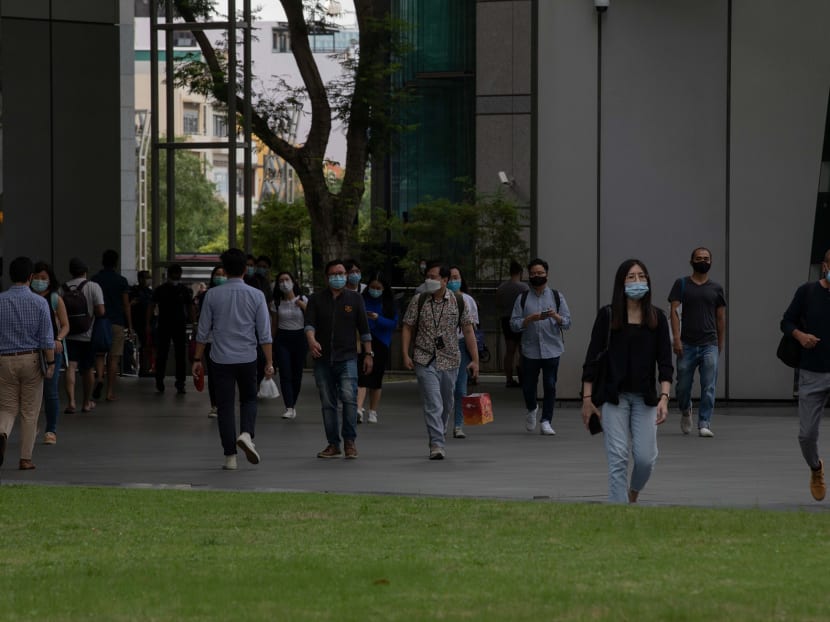S'pore's GDP would have contracted 12.4% in 2020 instead of 5.8% without Covid-19 support measures: MOF
SINGAPORE — With help from the Covid-19 support measures rolled out by the Government, Singapore’s economy shrank by 5.8 per cent last year — much less than the 12.4 per cent decline that would have occurred otherwise.

According to government estimates, the five Budgets in 2020 boosted the economy by 5.5 percentage points in 2020, which helped Singapore avoid a deeper economic recession.
- The Ministry of Finance on Thursday released a paper assessing the interim impact of Covid-19 support measures
- The schemes helped avert a deeper recession, MOF said
- Without them, Singapore’s 2020 GDP would have shrunk by 12.4 per cent and not 5.8 per cent
- The support measures also helped save or create some 155,000 jobs this year and the last
SINGAPORE — With help from the Covid-19 support measures rolled out by the Government, Singapore’s economy shrank by 5.8 per cent last year — much less than the 12.4 per cent decline that would have occurred otherwise.
Through these measures, Singaporean households received about S$2,000 per member on average last year, while S$27.4 billion in grants were given out to businesses.
This is a significant jump from the S$1.5 billion in grants handed out to businesses in 2019.
These figures came from a paper released by the Ministry of Finance (MOF) on Thursday (Feb 11).
The paper, titled “An Interim Assessment of the Impact of Key Covid-19 Budget Measures”, provides a preliminary assessment on how the Covid-19 measures rolled out in the five Budgets of 2020 have supported Singaporeans through the pandemic.
While noting that some of these schemes are still ongoing, Deputy Prime Minister Heng Swee Keat said that the preliminary findings show that the support measures have helped to cushion the impact of the ongoing recession.
“Job losses were averted, and more help went to support families in need,” said Mr Heng, who is also Finance Minister.
“The longer-term effects of the Budget measures can only be observed over a longer period of time. We will continue to stay vigilant, as the path to recovery remains uncertain.”
According to estimates by the Monetary Authority of Singapore (MAS), the five Budgets in 2020 added 5.5 percentage points to the growth in gross domestic product, while accommodative monetary policies added another 1.1 percentage points.
This helped the country avoid a deeper economic recession, said MOF in a press statement on Thursday.
The support measures also helped save or create an estimated 155,000 jobs on average over this year and the last.
Here are some of the key findings from the paper:
HELP FOR BUSINESSES
Among the Government schemes rolled out to help businesses, the Job Support Scheme (JSS), which provides wage support to employers to help retain their local workers, provided the largest amount of financial support.
A total of S$22.6 billion was disbursed under the JSS from April to December last year.
According to MAS, JSS helped with half of the 155,000 jobs that were created or saved through the various support measures
Aside from grants, the Government also supported enterprises through various financing schemes that helped more than 20,000 businesses in accessing loans worth S$17.4 billion between March and December last year, 13 times more than in 2019
Around nine in 10 of the supported businesses were micro and small enterprises
By industry, the wholesale trade, construction and manufacturing sectors received the largest amount of approved loans
HELP FOR HOUSEHOLDS
Singaporean households received about S$2,000 per member on average from the various Covid-19 support measures rolled out by the Government
Low income households and those living in smaller Housing and Development Board flats received higher levels of financial support, of up to S$2,800 per member
In the paper, MOF said that the Covid-19 support measures also helped to mitigate inequality here
After accounting for government transfers and taxes, the Gini coefficient — the index which measures income inequality in a country — in 2020 fell from 0.452 to 0.375
This is a reduction of 0.023 from the previous year
MOF said the significant reduction in 2020 can be attributed to the Covid-19 measures which were tilted to provide more help to those in the lower income groups who may lack other forms of support
HELP FOR WORKERS
As of December 2020, close to 76,000 jobseekers have been matched with jobs and skills opportunities under the SGUnited Jobs and Skills Package
Of these, 80 per cent, or 59,400 jobseekers, were placed into jobs. This exceeds the original target of 40,000 jobs
Six in 10 professional, manager, executive and technician (PMET) workers were placed into long-term jobs
As of December last year, the top five sectors into which most jobseekers were placed were: Information and communications and media, healthcare, manufacturing, professional services, and food services
The information and communications and media sector had the highest number of placements at 10,600, the bulk of which were traineeships and training opportunities
Early estimates as of October 2020 indicate that the Job Growth Incentive, which incentivises employers to hire locals through salary support, has supported over 110,000 new local hires
They were hired by around 26,000 employers within two months into the implementation of the scheme
Around half of these new hires were aged 40 and above











